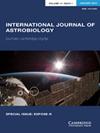模拟火星温度和风化层硫酸盐矿物组成条件下嗜冷Desulfotalea细胞中dsrAB操纵子表达的检测
IF 1
4区 物理与天体物理
Q3 ASTRONOMY & ASTROPHYSICS
引用次数: 0
摘要
火星极地冰盖中瞬态液态水的发现,以及结冰卫星中液态湖和地下海洋的存在,增加了科学家对陆地极端微生物在这些极端环境中生长和保持代谢活性的能力的兴趣。本研究的主要目标是了解厌氧嗜冷菌脱硫嗜冷菌的代谢能力,该菌在低于冰点的温度下,在含有不同浓度硫酸盐矿物质的培养基中培养。在这方面,我们的实验重点是检测嗜冷D.嗜冷菌的生存和活性代谢,使用了一种可以重现火星温度的生物琥珀。使用测定生长的标准细菌学方法,结合硫酸盐还原的分子和酶法测定,我们发现嗜冷假单胞菌能够在低至−5°C的温度下,在0.35至18wt%的MgSO4浓度范围内进行生物过程,0.1wt%的CaSO4和10-14wt%的FeSO4,其中最高的硫酸盐浓度逐渐使生物合成速率恢复到基础极限,并且最低的温度降低了细菌细胞分裂。众所周知,这些化学盐的离子被归类为超液,其作用是在低于冰点的温度下保持水分子的液态,并改变细胞成分的稳定性。这种“离液效应”可能有利于微生物的代谢活性,达到危及细胞活力的浓度。因此,我们的假设是针对代谢活性的检测,作为对这些离子对生物结构的灵活性/功能性的潜在影响的间接测量,这些生物结构在低温下由于水冻结而高度刚性、紧凑和部分/非功能性。考虑到嗜冷硫酸盐还原剂在其他行星和结冰卫星中生存和定殖的可能性,对这类微生物的研究至关重要。本文章由计算机程序翻译,如有差异,请以英文原文为准。
Detection of dsrAB operon expression in Desulfotalea psychrophila cells subjected to simulated Martian conditions of temperature and regolith's sulphate minerals composition
Discoveries of transient liquid water in the Martian polar caps and the presence of liquid lakes and subsurface oceans in icy satellites have increased the interest of scientists in the capabilities of terrestrial extremophiles to grow and remain metabolically active in these extreme environments. The principal goal of this research is to understand the metabolic capacity of the anaerobic psychrophile, Desulfotalea psychrophila, cultured at subfreezing temperatures in media containing various concentrations of sulphate minerals. In this regard, our experiments focused on the detection of D. psychrophila survival and active metabolism, employing a biochamber that can recreate Martian temperatures. Using standard bacteriological methods for determining growth, combined with molecular and enzymatic determination of sulphate reduction, we have found that D. psychrophila is capable to carry out biological processes at temperatures down to −5°C, at concentrations that range from 0.35 to 18 wt% of MgSO4, 0.1 wt% of CaSO4 and 10 to 14 wt% of FeSO4 in which the highest sulphate concentration gradually returned the biosynthetic rate to basal limits, and the lowest temperature decreased bacterial cell division. These chemical salts, whose ions are classified as chaotropes, are known to act by maintaining water molecules in liquid state at subfreezing temperatures and by altering the stability of cellular components. This ‘chaotropic effect’ could potentially benefit the microbial metabolic activity up to a concentration in which cellular viability is jeopardized. Consequently, our hypothesis is directed towards the detection of metabolic activity as an indirect measurement of the potential influence of these ions in the flexibility/functionality of biological structures that at cold temperatures are highly rigid, compact and partially/non-functional due to water freezing. Studies of this type of microorganism are critical considering the possibility of survival and colonization of psychrophilic sulphate reducers in other planets and icy satellites.
求助全文
通过发布文献求助,成功后即可免费获取论文全文。
去求助
来源期刊

International Journal of Astrobiology
地学天文-地球科学综合
CiteScore
3.70
自引率
11.80%
发文量
45
审稿时长
>12 weeks
期刊介绍:
International Journal of Astrobiology is the peer-reviewed forum for practitioners in this exciting interdisciplinary field. Coverage includes cosmic prebiotic chemistry, planetary evolution, the search for planetary systems and habitable zones, extremophile biology and experimental simulation of extraterrestrial environments, Mars as an abode of life, life detection in our solar system and beyond, the search for extraterrestrial intelligence, the history of the science of astrobiology, as well as societal and educational aspects of astrobiology. Occasionally an issue of the journal is devoted to the keynote plenary research papers from an international meeting. A notable feature of the journal is the global distribution of its authors.
 求助内容:
求助内容: 应助结果提醒方式:
应助结果提醒方式:


